Related Research Articles

Omdurman is a major city in Sudan. It is the most populous city in the country, and thus also in the State of Khartoum. Omdurman lies on the west bank of the River Nile, opposite and northwest of the capital city of Khartoum. It is on the Nile river and acts as an important road hub, with the Nile boosting transportation even further.
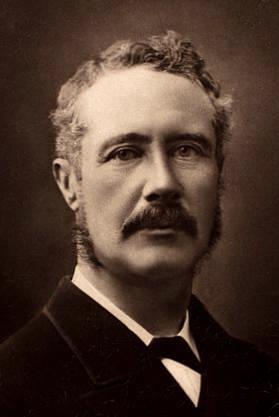
Major-General Charles George Gordon CB, also known as Chinese Gordon, Gordon Pasha, and Gordon of Khartoum, was a British Army officer and administrator. He saw action in the Crimean War as an officer in the British Army. However, he made his military reputation in China, where he was placed in command of the "Ever Victorious Army", a force of Chinese soldiers led by European officers which was instrumental in putting down the Taiping Rebellion, regularly defeating much larger forces. For these accomplishments, he was given the nickname "Chinese Gordon" and honours from both the Emperor of China and the British.

Muhammad Ahmad was a Nubian Sufi religious leader of the Samaniyya order in Sudan who, as a youth, studied Sunni Islam. In 1881, he claimed to be the Mahdi, and led a successful war against Ottoman-Egyptian military rule in Sudan and achieved a remarkable victory over the British, in the siege of Khartoum. He created a vast Islamic state extending from the Red Sea to Central Africa, and founded a movement that remained influential in Sudan a century later.
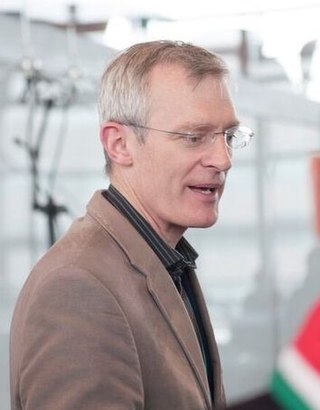
Jeremy Guy Vine is an English television and radio personality, presenter, broadcaster and journalist. He is best known as the host of his BBC Radio 2 lunchtime programme which presents news, views, interviews with live guests and popular music, taking over from long time host Sir Jimmy Young in 2003.

Khartoum is a 1966 British epic war film written by Robert Ardrey and directed by Basil Dearden. It stars Charlton Heston as British General Charles "Chinese" Gordon and Laurence Olivier as Muhammad Ahmed, with a supporting cast that includes Richard Johnson and Ralph Richardson. The film is based on historical accounts of Gordon's defence of the Sudanese city of Khartoum from the forces of the Mahdist army, during the 1884–1885 Siege of Khartoum. The opening and closing scenes are narrated by Leo Genn.
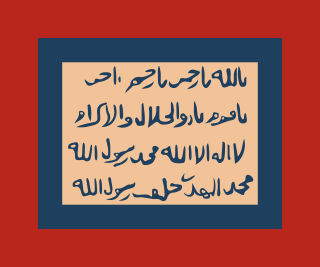
The Mahdist State, also known as Mahdist Sudan or the Sudanese Mahdiyya, was a state based on a religious and political movement launched in 1881 by Muhammad Ahmad bin Abdullah against the Khedivate of Egypt, which had ruled the Sudan since 1821. After four years of struggle, the Mahdist rebels overthrew the Ottoman-Egyptian administration and established their own "Islamic and national" government with its capital in Omdurman. Thus, from 1885 the Mahdist government maintained sovereignty and control over the Sudanese territories until its existence was terminated by the Anglo-Egyptian forces in 1898.

This article covers the period of the history of Sudan between 1985 and 2019 when the Sudanese Defense Minister Abdel Rahman Swar al-Dahab seized power from Sudanese President Jaafar Nimeiry in the 1985 Sudanese coup d'état. Not long after, Lieutenant General Omar al-Bashir, backed by an Islamist political party, the National Islamic Front, overthrew the short lived government in a coup in 1989 where he ruled as President until his fall in April 2019. During Bashir's rule, also referred to as Bashirist Sudan, he was re-elected three times while overseeing the independence of South Sudan in 2011. His regime was criticized for human rights abuses, atrocities and genocide in Darfur and allegations of harboring and supporting terrorist groups in the region while being subjected to United Nations sanctions beginning in 1995, resulting in Sudan's isolation as an international pariah.

The dominant religion in Sudan is Islam at 90.7% of the population while Christianity forms 5.4% of the population according to Pew Research Center. In September 2020, Sudan constitutionally became a secular state after Sudan's transitional government agreed to separate religion from the state, ending 30 years of Islamic rule and Islam as the official state religion in the North African nation. It also scrapped the apostasy law and public flogging.

The siege of Khartoum occurred from 13 March 1884 to 26 January 1885. Sudanese Mahdist forces captured the city of Khartoum from its Egyptian garrison, thereby gaining control over the whole of Sudan.
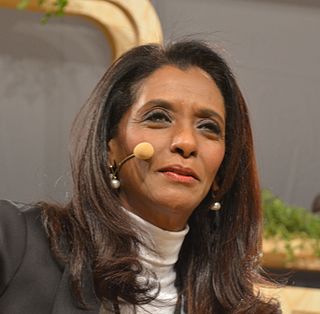
Zeinab Badawi is a Sudanese-British television and radio journalist. She was the first presenter of the ITV Morning News, and co-presented Channel 4 News with Jon Snow from 1989 to 1998), before joining BBC News. Badawi was the presenter of World News Today broadcast on both BBC Four and BBC World News, and Reporters, a weekly showcase of reports from the BBC.
As of the early 2000s, Sudan had one of the most restrictive media environments in Africa. Sudan’s print media since independence generally have served one of the political parties or the government in power, although there occasionally were outspoken independent newspapers.
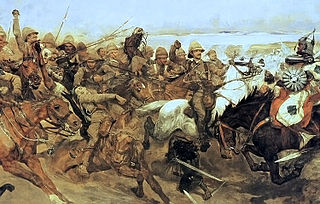
The Mahdist War was a war between the Mahdist Sudanese of the religious leader Muhammad Ahmad bin Abd Allah, who had proclaimed himself the "Mahdi" of Islam, and the forces of the Khedivate of Egypt, initially, and later the forces of Britain. Eighteen years of war resulted in the nominally joint-rule state of the Anglo-Egyptian Sudan (1899–1956), a de jure condominium of the British Empire and the Kingdom of Egypt in which Britain had de facto control over the Sudan. The Sudanese launched several unsuccessful invasions of their neighbours, expanding the scale of the conflict to include not only Britain and Egypt but also the Italian Empire, the Congo Free State and the Ethiopian Empire.

The Nile Expedition, sometimes called the Gordon Relief Expedition (1884–85), was a British mission to relieve Major-General Charles George Gordon at Khartoum, Sudan. Gordon had been sent to the Sudan to help Egyptians evacuate from Sudan after Britain decided to abandon the country in the face of a rebellion led by self-proclaimed Mahdi, Mahommed Ahmed. A contingent of Canadians was recruited to help the British navigate their small boats up the Nile River. The Nile Expedition was the first overseas expedition by Canadians in a British imperial conflict, although the Nile Voyageurs were civilian employees and did not wear uniforms.
The World Today was BBC World Service's early morning news and current affairs programme, which as of 2011 was broadcast from 3:00 to 8:30 (GMT) daily. It consisted of news bulletins on the hour and half hour, serious international interviews and in-depth reports of world news. The World Service considered it to be one of their most important strands, and it won a Sony Radio Academy Award in 2009. Both The World Today and its fellow news programme Network Africa ended in 2012, when they were replaced by a new programme entitled Newsday.
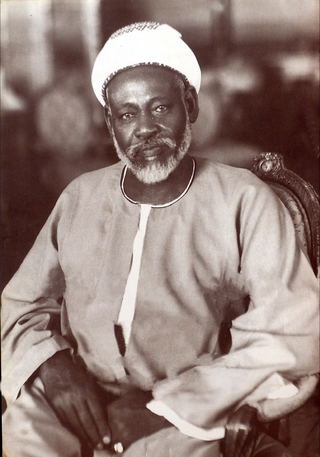
Sayyid Abd al-Rahman al-Mahdi, KBE was one of the leading religious and political figures during the colonial era in the Anglo-Egyptian Sudan (1898–1955), and continued to exert great authority as leader of the Neo-Mahdists after Sudan became independent. The British tried to exploit his influence over the Sudanese people while at the same time profoundly distrusting his motives. Throughout most of the colonial era of the Anglo-Egyptian Sudan the British saw Sayyid Abd al-Rahman al-Mahdi as important as a moderate leader of the Mahdists.
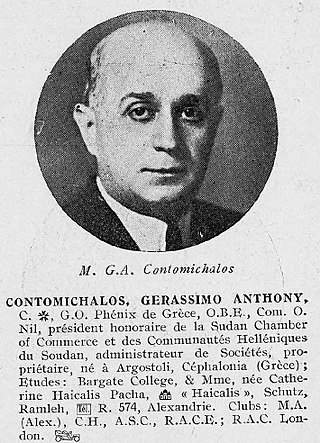
Gerasimos Antonios Contomichalos was the most eminent business magnate in the Anglo-Egyptian Sudan and the greatest benefactor of the Greek community in Sudan. He wielded considerable political influence both in Sudan and Greece.

Photography in Sudan refers to both historical as well as to contemporary photographs taken in the cultural history of today's Republic of the Sudan. This includes the former territory of present-day South Sudan, as well as what was once Anglo-Egyptian Sudan, and some of the oldest photographs from the 1860s, taken during the Turkish-Egyptian rule (Turkiyya). As in other countries, the growing importance of photography for mass media like newspapers, as well as for amateur photographers has led to a wider photographic documentation and use of photographs in Sudan during the 20th century and beyond. In the 21st century, photography in Sudan has undergone important changes, mainly due to digital photography and distribution through social media and the Internet.

The Mahdi's tomb or qubba is located in Omdurman, Sudan. It was the burial place of Muhammad Ahmad, the leader of an Islamic revolt against the Ottoman-Egyptian occupation of Sudan in the late 19th century.

The jibba or jibbah, originally referring to an outer garment, cloak or coat,) is a long coat worn by Muslim men. During the Mahdist State in Sudan at the end of the 19th century, it was the garment worn by the followers of the Mahdī. Muhammad Ahmad proclaimed himself al-Mahdī al-Muntaẓar, successor of the Prophet Muhammad, in 1881. He exhorted his followers to join a jihad against the Ottoman-Egyptian occupation of Sudan.
References
- 1 2 "Fergus Nicoll". BBC World Service website. BBC. Retrieved 19 December 2008.
- ↑ "School of Government & International Affairs : Sir William Luce Fellowship - Durham University". www.dur.ac.uk. Archived from the original on 1 May 2012.
- ↑ "Sony Awards 2009: Winners list". BBC News. 12 May 2009. Retrieved 17 March 2018.
- ↑ "AIBs 2012: Winners&Finalists" (PDF). AIB. 2012. Retrieved 21 March 2018.
